
Derbyshire bridge shortlisted for sustainability award
The Peak District's Cressbrook Mill footbridge has been shortlisted in the 2025 Bridges Award, thanks to its impressive sustainability credentials.
In total, 25,781 recycled plastic bottles were diverted from landfills and transformed into the Fibre Reinforced Polymer (FRP) used to construct the bridge.
Given the Peak District’s unpredictable weather, the polymer was chosen for its durability, ensuring the bridge can withstand the harsh Yorkshire elements.
Matt Cain, contracts manager at R and C Williams – the engineering company awarded the contract for the bridge – said: "These bridges are rare – it’s just getting people to buy into the upfront cost, because compared to a steel or timber bridge, it’s double the price.
"But then, the use of FPC means you don’t have ongoing maintenance, so it’s about people being long-sighted enough to see the reduced costs in the future."
The footbridge is expected to have a multi-generational lifespan of up to 120 years. In comparison, a steel bridge which would need significant maintenance after 25 years.
Its construction has also enabled walkers and climbers to access the Monsal Trail from Cressbrook for the first time in nearly five years, reconnecting people with one of the Peak District’s most iconic landscapes.
The original bridge, built in the 1980s, was deemed structurally unsafe in 2020, having succumbed to corrosion and fallen into disrepair.

Several fundraising groups came together to raise the £190,000 needed to complete the project, including the Peak District National Park Authority and the British Mountaineering Council.
Now, the Cressbrook Footbridge has been shortlisted in the sustainability category at the 2025 Bridges Awards. This category celebrates innovation in reducing carbon emissions through bridge design, construction, and maintenance.
Mr Cain said: "We’re not a huge company, so to be shortlisted with some of your lager tier 1 contractors is great.
"I think we’re up against Transport for London in the sustainability category, so even to be shortlisted is great for us. Hopefully we take the award home."
The bridge will go up against the River Lea Crossing Refurbishment for the title at the Bridges award ceremony on March 12th.

The Miners’ Strike 40 years on: The lasting impact of coal on South Yorkshire
Miners across South Yorkshire returned to work 40 years ago next week, but the effects of coal’s decline are still weighing down former coalfield communities today.
The year-long strike did little to prevent the demise of the biggest industry in South Yorkshire, and the prospect of new jobs and industries are still yet to fully arrive.
Last year, reports into former coalfield communities by Sheffield Hallam University showed that even though some growth had been seen, it is at a far slower rate than other areas in the UK.
Former coalfield communities have on average 57 jobs per 100 working age residents, compared to 73 in 100 nationally, and 88 in 100 in other regional cities.
To add to this, wages near the former coalfields are in some cases six or seven percent below the national average.
The days of busy mining communities may have long gone, but a determined effort has been made to preserve the legacy of the pits and attempt to revive once forgotten communities. But even when help originally came to these communities, there was shock at the neglect felt in the wake of sweeping pit closures.
Colin Harris is a Former Director at Arup, a global collective of designers and engineers, that played a major role in creating Manvers Lake on the site of the former Manvers Colliery in Wath Upon Dearne, Rotherham.
In October last year, he said: “Driving there was an emotional experience because you could see all the shops were closed down, all the facilities had closed down.
“It was utter dereliction, not just on the site, but around the site.”
How South Yorkshire is Remembering the Miners’ Strike
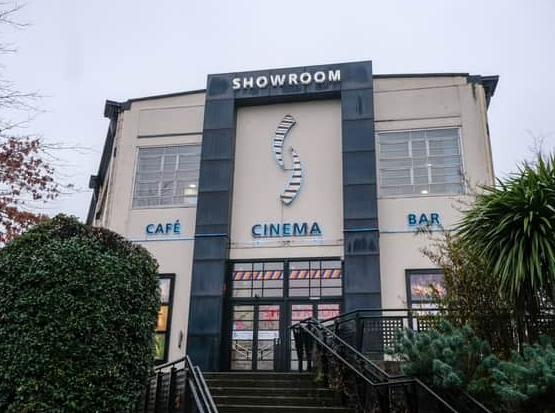
Museums and cinemas across South Yorkshire have been holding events and exhibitions over the past 12 months to commemorate the strike, many of them showcasing the lasting impact both economically and mentally on communities.
Films, blogs and podcasts have all been produced and shared throughout the year, including several next month at the Showroom Cinema in Sheffield.
Barnsley Museums have worked in partnership with the National Coal Mining Museum, to share local people’s objects and artefacts relating to the strike and the impact on the community.
Barnsley Cllr Robin Franklin, Cabinet Spokesperson for Regeneration and Culture, said: “The Miners’ Strike was a defining episode in our history, nationally, regionally and locally. We felt it was vital to mark its 40th anniversary.
“In Barnsley Museums we’ve spent a full year sharing the memories of local people, giving them the opportunity to reflect on everything that happened in that year and also the immense changes Barnsley has seen since.”
History of the Strike

The strike ended three days short of its first anniversary in early March 1985, when the National Union of Mineworkers voted to return work, bringing one of Britain’s longest industrial disputes to an end.
Arguably the most well known scene of the strike was the ‘Battle of Orgreave’, where pickets and police forces clashed outside of Orgreave Coking plant in Rotherham on June 18 1984, in one of the most violent clashes in British industrial history.
Almost 10,000 miners were arrested across England during the strikes, the majority of whom never faced prosecution in court.
The strike’s origins were in Rotherham, where Cortonwood Colliery was threatened with closure by the National Coal Board.
A generation later and Cortonwood, along with the rest of South Yorkshire’s Pits, are closed, many having been replaced with new projects to try and lift areas left in the lurch.
Cortonwood Shopping Centre now stands on the site of the old colliery, but its closure in 1985 is still felt in the community today.
The number of jobs lost to pit closures have never fully been combated, meaning the cost of living crisis hit particularly hard in ex-mining communities.
Cortonwood Comeback Centre, a group that was founded in the wake of the strike, still works today to support people in the community.
Denise Lelliott, a trustee at the Centre, said: “We have witnessed a massive increase in demand for our services over the last ten plus years.
“We are having to deal with issues that we would have never thought possible 40 years ago, these include homelessness, unemployment and lack of access to services.”
The centre offers a warm space for people to go during winter, as well as a foodbank and also a social group for older men, especially former miners.
“We have seen thousands of homes being built in the area, but with no infrastructure to support these,” said Ms Lelliott.
“A number of people living in these homes in Brampton and West Melton have been left behind, neglected and under-resourced.”
Using Nature to Renovate Former Coalfield Communities

Shopping isn’t the only means which has been used to attempt to renovate areas that lost their main source of income and community.
Wath Upon Dearne in Rotherham is now home to Manvers Lake, an area that had laid derelict following the closure of Manvers Main Colliery.
Arup, developed a plan to create new opportunities for the community, alongside bringing nature back to the community, through the creation of the lake.
They focused on job creation, economic regeneration and environmental improvement, to reinvigorate a community devastated by closures.
The area, which was redeveloped in the 1990s, had been left forgotten and had a lack of prospects for its residents, until work was made to bring nature, and most importantly footfall, back to Wath and Manvers.
Tim O’Connell, of Rotherham Metropolitan Borough Council, said: “People didn’t have a reason to come to Manvers at all, and wouldn’t be aware of Manvers unless you were associated with the coal mining industry.
“You’ve moved from a site which was a former coalfield at the end of its useful economic purpose, and now when you drive into Manvers and what you can see is something that is completely different.”

Uncertainty for Ukrainians in Sheffield
Image courtesy: Sheffield Star
The flags have stopped waving, the welcome banners have been put away and the headlines have faded- but the war is as bad as ever for Ukrainians.
That's the view of a Ukrainians who say Britain's initial support was "tremendous" but without it being plastered over the media, people are beginning to forget.
“Three years is a long time, you cannot expect the issue on top of our agenda is on top of everyone else's. Regardless of how disappointing it is for us, we have to accept reality," says Anton Ievsiushkin.
Three years after Russia's full-scale invasion of Ukraine, visa extensions in the UK coming to an end and Russian occupation still rife, the future for Ukrainian refugees is full of uncertainty.
Mr Ievsiushkin, 41, Chair for the Sheffield branch of the AUGB, was born and raised in Mariupol, but relocated to Sheffield for work in 2014.
Mr Ievsiushkin's family all lived in Mariupol, up until 2022, when they had to flee as Russian forces invaded the city.
"Mariupol was pretty much destroyed, it was definitely not the place to be in 2022."
Mr Ievsiushkin
Sheffield has become home to over 1,000 Ukrainians, including Mr Ieviushkin's family, but their journey wasn't without its challenges.
Mr Ievsiushkin says: "When people flee war torn countries, it is never easy. My father-in-law for example, left his passport. So he had no internationally recognised ID, so that created its own problems."
His niece was less than two-months old when they fled Ukraine, so did not have any identification either.
In early 2022, the Johnson government announced a relaxation of immigration rule for Ukrainians and their families after major pressure from the public.
Mr Ievsiushkin said: "I have to credit the Foreign Office officials, back then they came up with something very quickly."
This led to the creation of special schemes: the Ukraine Family Scheme and the Homes for Ukraine scheme, which allowed approximately 218,000 people to seek refuge in the UK.
Ukrainians who are here under these schemes were given the right to work, claim benefits and use the NHS.
Visas last for around three years and the government announced that from February 2025, these visas could be extended for an additional 18 months.
However, there is currently no opportunity for permanent residence under these schemes.
Ukrainian communities in Sheffield are worried about their future in the UK and what will happen when the extension on their visas expire.
Mr Ievsiushkin said: "People clearly cannot go back to Ukraine. It is not clear what we can do."

Many Ukrainian cities, including Mariupol, are currently under Russian occupation meaning that people cannot return home.
Mr Ievsiushkin's mother tried to return to the city to visit her home and see for herself what had happened, but when she flew into Moscow, border control told her that she was not welcome.
Many Ukrainians cannot return home, but the option to stay in the UK is potentially coming to an end.
When you are living on a time-limited visa, your right to rent, to work and your access to certain services is limited by the end date.
Many Ukrainians have issues extending work contracts and housing tenancies, because their visa is close to expiring and cannot be given a 12-month contract.
Mr Ievsiushkin said: "Even when you tell them there is official guidance from the Home Office, there is still a hurdle that shouldn't be there.
"There are probably reasons for the Home Office to do this, for us it is just another bureaucratic nightmare."
The AUGB was founded in 1946, initially as a form of solidarity for Ukrainians who were being persecuted but the association has now become a support system for those struggling with issues such as translating.
Mr Ievsiushkin said: "We do not think Ukrainians are unique in this situation, it is not just the visas that are a nightmare. There is a lack of support for navigating all the bureaucratic things for everyone.
"We would love to get more support but I'm afraid it is an indication of a wider societal problem."
Mr Ievsiushkin

Jane Podmoloda, 19, is a student at the University of Sheffield and moved to Sheffield in 2022 with her family.
She is worried about what will happen after the 18-month extension on her own and her family's visas comes to an end.
Miss Podmoloda explained that three years is a long time to live in a country and that Sheffield has become her home.
Ukrainian legacies have not entirely been forgotten by Sheffield, the AUGB has put on the 'Wounded Ukraine' art exhibition to highlight the "heart-breaking" stories of widows, mothers and children who have endured trauma and loss as a result of the war.

Sheffield United vs Leeds United: Dominic Picksley comments ahead of tonight’s game
A big match is set to take place at Bramall Lane Stadium tonight with Sheffield United set to take on Leeds United.
A win for the Blades would see them moving to the top of the Championship table, yet both teams head into the 8pm match in strong positions as they have both won each of their last four matches.
Dominic Picksley, a Sports Page Editor for PA Sport said: “Daniel Farke’s side are unbeaten in 15 league games and two points clear of the Blades at the summit ahead of one of the most eagerly-anticipated fixtures of the campaign.”
He said this match “should not disappoint as you’d expect both sides to go hell for leather."
Chris Wilder said he believes his team has everything it takes to achieve promotion back to the Premier League and win tonight’s game.
Dominic Picksley said: “The Whites hold something of an Indian sign over their near-neighbours after tasting success in the last three encounters between the two fierce rivals separated by the M1, while the home side will, in turn, be full of confidence after stringing four successive victories together."
Farke has labelled tonight’s match as their “toughest of the season”, while also praising “unbelievable” former Blade Jayden Bogle, who has played a significant role at Elland Road since making the switch in the summer.
He said that former players “have a habit of haunting old clubs on their returns to their old stomping grounds, so many eyes will be on the 24-year-old who Farke declared “one of the best signings of the summer.”
There is a lot of anticipation ahead of tonight’s game, with so much at stake and both managers confident of their team’s ability it is hard to say what the outcome will be.

Sheffield businessman takes on ‘One-Year-No-Haircut Challenge’ for charity
A year of floppy locks, headbands and several extra bottles of conditioner; that’s the story of one Sheffield businessman who swapped his usual formal attire for a more natural look, undergoing a dramatic transformation for a unique ‘One-Year-No-Haircut’ challenge.
Paul Hardy, 65, owner of Hardy Transactions, celebrated his 65th birthday on February 7 by finally visiting the barber, marking the end of his year-long endeavour.
He said: “I just wanted to do something to raise money for charity. I’m not going to cycle to Paris, I’m not going to swim 150 lengths, nor am I going to sit in a bath full of custard, so this was the line of least resistance.”
His efforts were rewarded with a £5426 fundraising total for Ben’s Centre, a local charity which provides a safe space for people suffering from substance misuse.
“Surprisingly, people have said it looks alright, it doesn’t look silly or embarrassing at all," Paul said.
The businessman's hair-growth challenge even sparked a family-affair after his eldest son joined him and got his hair cut during half-time at the Super Bowl.
Paul openly admitted to holding unkind thoughts in the past about men in business with unkept hair. His mission was just as much a personal challenge in overcoming past judgement as it was a charitable act.
He said: “Washing hair which is very long involves a great deal of physical effort which I hadn’t anticipated at all.”
It’s no surprise then that Paul’s main motivation was supporting a charity that helps others in a non-judgmental way.
“We see people in the street everyday who we assume are homeless because they’ve become addicted to substances, and I know that’s not always the case," said Paul. "All of us are only a few bad decisions away from being in the same situation.”
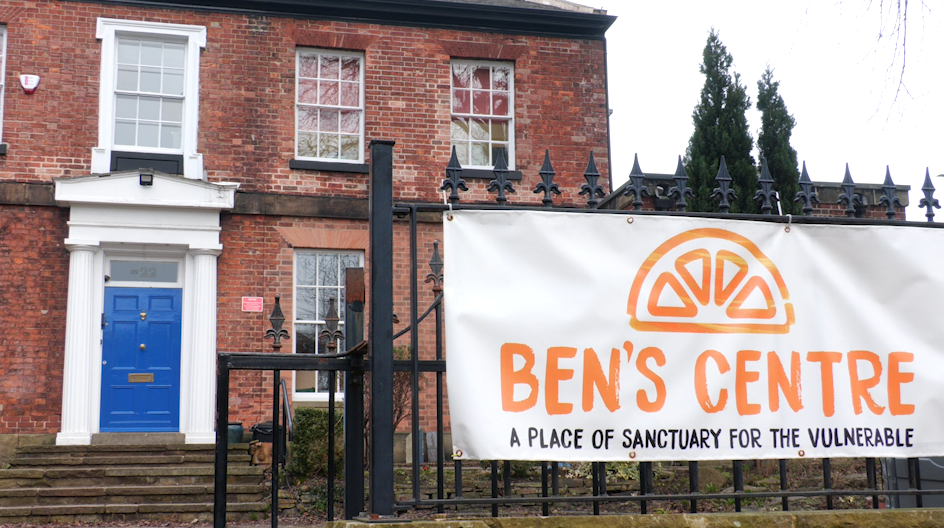
Donald Beedham, Marketing and Communications Officer at Ben’s Centre, said: "We appreciate all fundraising efforts. It really helps us."
Recognisable by its blue door, the charity provides a daily drop-in service for those suffering with substance abuse, welcoming nearly 40 people every day.
The charity provides clients with a hot meal and access to clothing and washing facilities, as well as support with well-being and housing. It is the only 'damp' centre in Sheffield and surrounding areas, meaning people can access their services while under the influence.
Mr Beedham explained this approach is vital to ensure people are not cut off from other services in the city.
“A lot of our clients don’t have the capacity to get up in a day without having a drink," he said. "We don’t want to prevent their access to food, clothing and hygiene just because they need to have a drink beforehand.”
However, the generalisation of homeless people presents one of the biggest challenges. Many clients of the Ben’s Centre are in some form of accommodation but have experienced trauma in their early lives and out on the streets, some even suffering brain injuries.
Mr Beedham said: “We just want it to be a happy and welcoming environment where they can forget about the chaos of their lives for a few hours every day.”
As the cost of living crisis continues, the number of people accessing the Ben’s Centre may well further increase. Paul’s fundraising efforts will hope to alleviate some of the financial pressures, ensuring their vital work continues.
But Paul’s hair growth journey isn’t over yet; he now has his sights set on a ponytail!
You can donate to Paul's endeavour via his GoFundMe.
Watch the full story here.
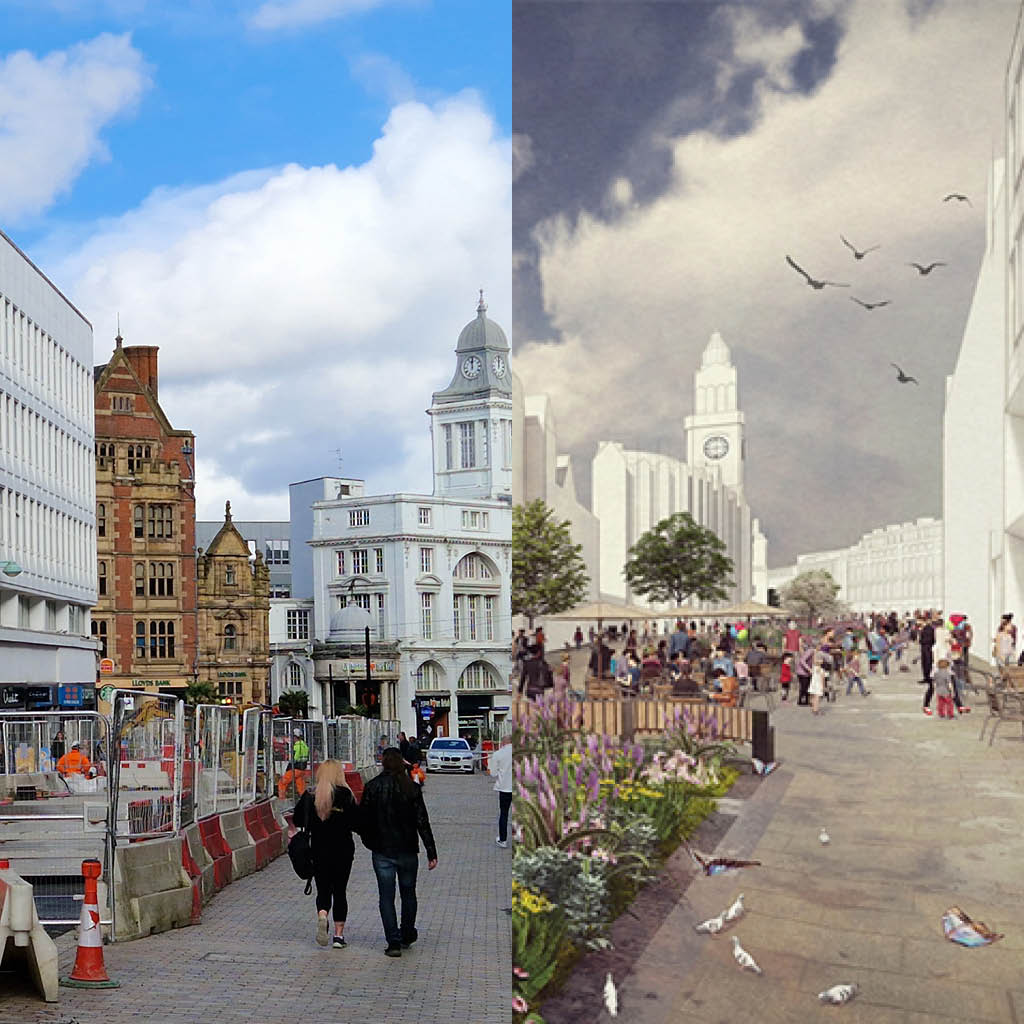
Sheffield’s Fargate is the latest in a long list of the city’s redevelopment projects behind schedule
When will Sheffield's City Centre ever be done? That's the question on everybody's lips four years after the city council was given millions to breathe new life into Fargate.
The Fargate restoration has been underway since 2023, connecting the new Castlegate Quarter - still under construction - to the ‘heart of the city’ - also still under construction. Today Councillor Ben Miskell, who is in charge of the regeneration of Sheffield, vowed Fargate would be "substantially ready" within weeks.
Fargate’s restoration project received a £15.8 million cash injection back in 2021 after a successful government bid from the “Future High Streets Fund”, and will eventually become a social hub showcasing the city’s diverse talent in the new Event Central building. The building will showcase local artists, exhibitions, performances, talks and events.
Work for this new building will start in either the spring or summer of this year, despite the funding having been in the bag for the past four years.

Fargate will also feature flower planters inviting insects, while comfortable seating areas and adequate lighting is set to make it a vibrant and welcoming place for all.
This idea was inspired by the award winning Grey to Green scheme, with work beginning back in 2023. Sheffield City Council told the BBC this part of the project will be ready by February, but Cllr Miskell told Sheffield Wire that this has been pushed back and will now be ready by mid-March.
He said: "Historically Fargate has been the heart beat of the city centre, it will still be a place to buy things, but It will also be a fabulous event space as well. Over the next few weeks we'll bringing an end to that project and by Mid-March it will be largely done."
Cllr Miskell also said Sheffielders have become used to construction around the city centre because it means progress.
The original grant from the Future Hight Streets Fund was £15.8 million, and the initial estimated cost of Fargate at the start was £8.8 million. The estimated cost of Fargate so far stands at £14.4 million, taken from a total pot of £33.6 million according to the current Council figures.

Cllr Miskell said: "Its important to be really clear with people isn't it, and projects like this do take time, when we build extensions to our houses we know it could take weeks, months and sometimes years. Here we are talking about really complex situation. But yes Fargate will be substantially ready by mid-March.
"I remember someone asked me when will the city centre be finished and my answer to that is a good city centre is never finished."
Sheffield City Council's original regeneration plan said: “By 2038 The city will be a stronger, more inclusive sustainable city. It will also be known as a city that increases the skills of its people and the productivity of its businesses, enabling everyone to reach their full potential regardless of where they live or grew up.”
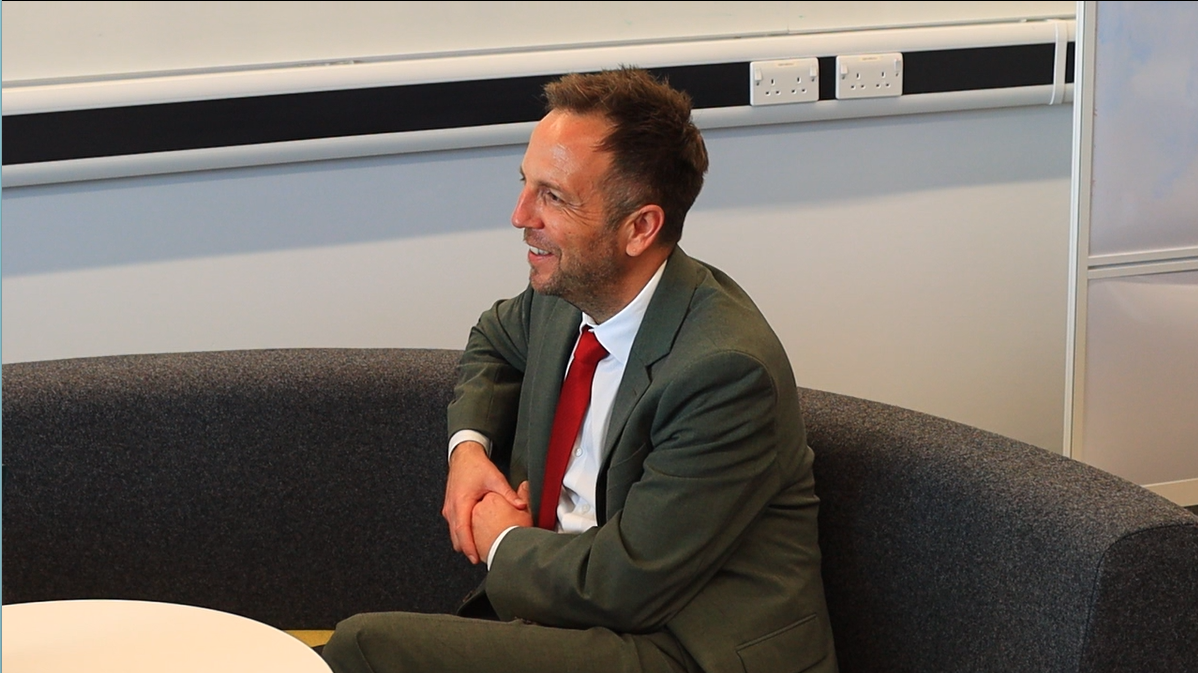
Massive new homes plan will “make sure people can stay in Sheffield”
An ambitious regeneration masterplan for Sheffield will "contribute to the economy and keep money in people's back pockets."
Speaking to Sheffield Wire earlier today, Cllr Ben Miskell discussed the plans for regeneration in Sheffield, and how that encompassed housing.
The Chair of the Transport, Regeneration and Climate Policy Committee, Cllr Miskell, spoke of the council's “masterplan”, which contributes to the building of 20,000 homes across Sheffield by 2039 in central areas, Neepsend and Furnace Hill, Moorfoot and the station.
These developments include an intended 20% of affordable housing with a variety of different models and tenures suitable for different people.
Cllr Miskell said: “We realise that the market hasn’t worked in Sheffield as much as we would have wanted it to in terms of providing the sorts of homes that people need.”
He said their aims were, “to improve the housing quality but also to be able to get more affordable homes and more social rented homes as well”.
These types of affordable developments come at a key time, with Sheffield falling short in comparison to other major cities across England.
Data from the Ministry of Housing, Communities & Local Government showed that there was no additional affordable housing provided by local authorities in Sheffield between 2023-24.
Cllr Miskell attributed some of the city’s loss of social housing to the Right to Buy scheme, where properties have been lost from council ownership and taken into the public sector.
A lack of council homes in Sheffield is a growing issue, with the waiting list standing at nearly 25,000 people.
Cllr Tom Hunt announced in February 2024 that there would be 1000 new council homes built by 2029 however, a report by Yayha Aydin into low use homes in Sheffield showed that there are over 700 vacant council homes.
Cllr Miskell said: "We are working with registered social landlords and with government agents Homes England in order to package together different sites across the city to be able to develop social housing.”
He acknowledged growing rent prices and said: “We are committed to making sure that people have a home, at a rent level they can enjoy.”
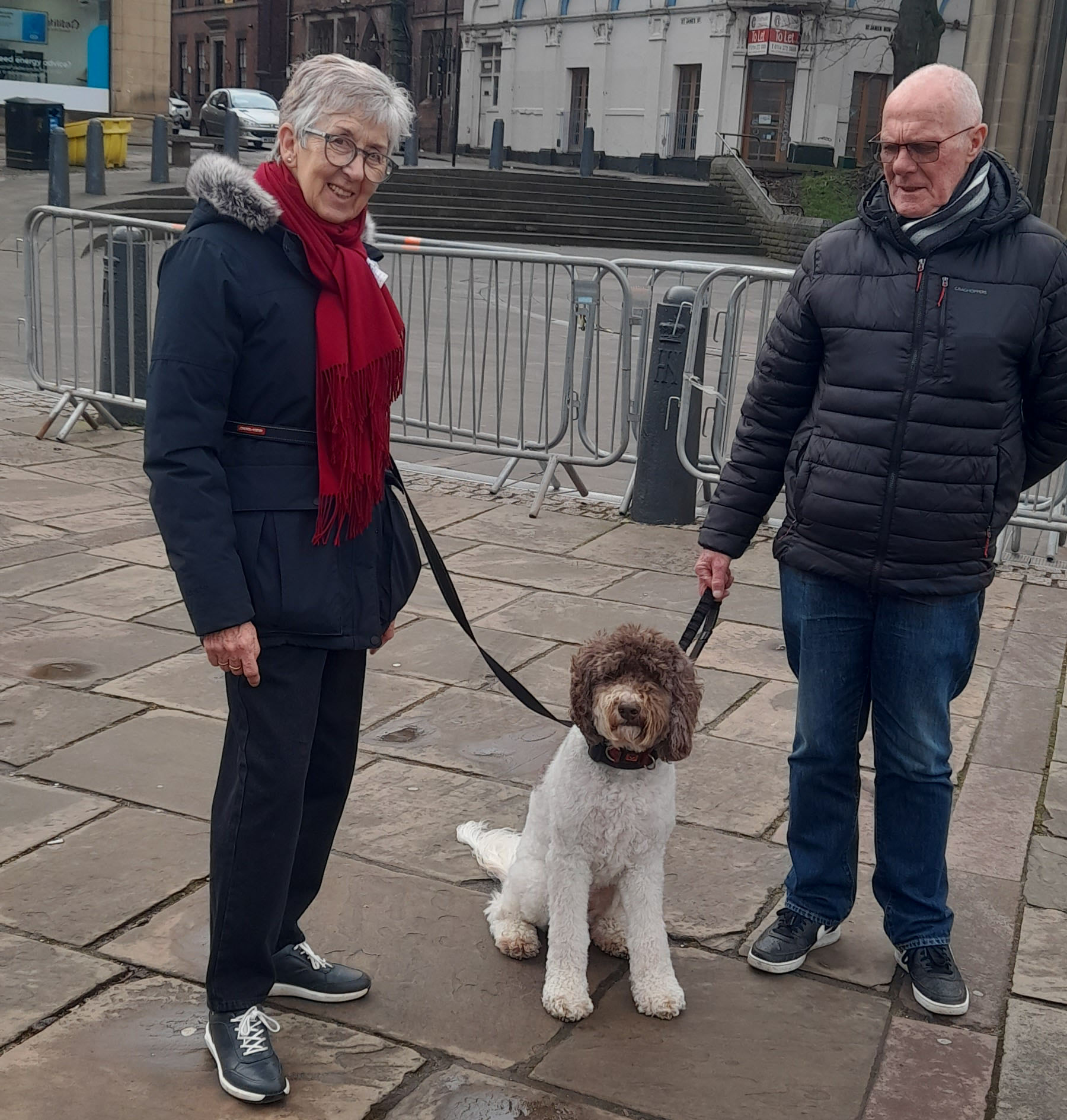
A ruff ride? Sheffield citizens share their views on letting dogs board the Supertram
A proposal that would allow dogs to ride on the Sheffield tram network has been met with mixed reactions from the public.
Today, the Sheffield Wire spoke to people across the city centre, as a public consultation on the matter by the South Yorkshire Mayoral Combined Authority enters its final week.
Some people have said that I’m barking mad for not letting all dogs on trams - it’s been a great bone of contention for them.
Oliver coppard, SOUTH YORKSHIRE mayor
Currently, only service animals and dogs in carry-cages are allowed onto the Supertram network, which connects cities and towns across South Yorkshire.
One tram-goer said: "Dogs should be forbidden - except for the blind."
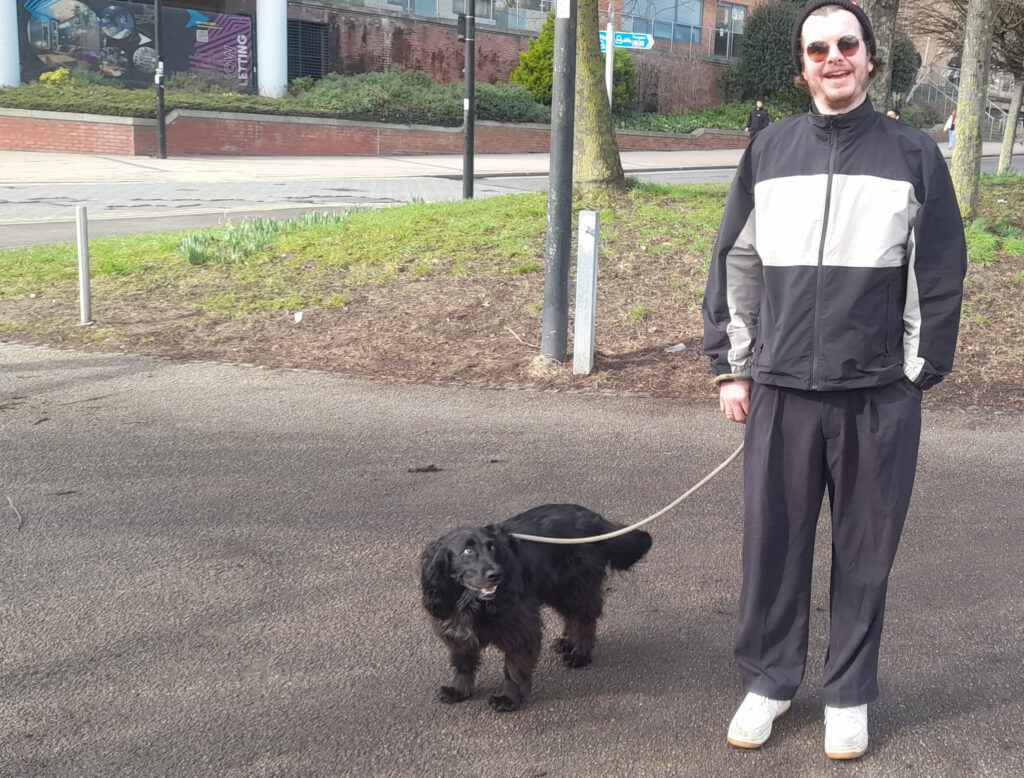
However, many dog owners were supportive of a change to the rules, saying it would improve transport accessibility, and would likely result in them using the tram more often. But some feared that untrained animals would cause disruption on the trams, or frighten passengers with a fear of dogs.
Jamie Lee, who recently moved with her dog closer to the city centre, said: "If I could take Bella on, I'd use the tram more."
One couple, Sue and Mick Owen, found themselves divided on the issue. Sue believes the changes would be "wonderful" - but Mick had some reservations.
Sheffield's canine citizens - and their owners - shared a range of views on the matter with us.
Mrs. Owen and Ms. Lee both pointed out that non-service dogs are allowed on other bus & train networks in South Yorkshire, without issue, making the Supertram an outlier.
Mrs. Owen said: "If dogs aren't a problem on the bus, then I can't see why they should be a problem on the tram."
The SYMCA took the Supertram back into full public ownership last year, and the consultation comes as part of broader plans to integrate and expand South Yorkshire's transport networks into a cohesive whole.
Oliver Coppard, the regional mayor, said: “The brilliant thing is that choices like this are now ours to make since we took back public control of Supertram."
Sheffield City Council is also involved in plans for the future of the tram network, with the hope it could spearhead a broader regeneration of the city centre.
Cllr. Ben Miskell, chair of the Transport Committee on the Council, said: "We know well-behaved dogs can coexist with public transport. However, people may have different views - and we do want to hear them."
The consultation closes on 3rd March at noon. To hear some responses from Sheffield's citizens, watch the video below!

Bands dejected over Leadmill’s eviction: “Leadmill is the people that work there”
Sheffield bands have expressed their disappointment after a judge ruled against the tenants of a 45-year-old music venue and enforced an eviction notice.
The Turncoats, who have previously played in the 900-capacity building, said: "If The Leadmill disappears then grassroots gigs will end up in the hands of companies such as the O2 Arena which is another huge faceless chain."
The owner and landlord of the building, Electric Group, originally served notice on tenants The Leadmill Ltd, which owns the iconic brand, back in March 2022.
A judge dismissed the tenant's appeal last Wednesday, meaning that they will have to leave the venue within three months and 21 days of the ruling.
Joe Murphy, a bass player for Sheffield band Frogmango, said he was doubtful that new management will be able to capture the soul of place.
He said: "It is really disheartening to be honest. Switching the management means the place won't be the same."
The grassroots music venue has been a culturally significant institution for Sheffield which has seen notable bands nationwide such as The Stone Roses and Coldplay perform. Following the ruling, local musicians are worried about the future of the venue.
A spokesperson for the landlord has reassured the public on the future of this building. They said: "It will continue to be a cornerstone of the live music scene in Sheffield, supporting artists, fan, and community projects for the next 100 years."
However, while some have spoken out about their concerns that the London-based landlord will ruin the spirit of the venue, Joey Pollard from the band Polat voiced his doubt about the Leadmill's campaign to hold onto their tenancy.
Mr Pollard expressed sadness at the possibility that the band may never get to play at the iconic building, however he said: "The grassroots underdog narrative they [the tenants] have been pushing in an attempt to drum up support rubs me the wrong way."
He said he believed members of the public had been convinced that they were saving a part of Sheffield as opposed to "the interests of a wealthy business person whose business is about to be bought out by another, richer businessman."

Phil Mills, who has trademarked The Leadmill business and name, was given the opportunity to buy the building back in 2014 when it went to auction. The reasons for his refusal to buy the building is not public and he has not spoken out since the ruling.
Leadmill Ltd was approached for comment but did not respond. However it released a statement in which it said it will continue to liaise with their legal advisers.
The statement added: "We are in it together, doing everything we can to fight for the place that means so much to us and to so many others."

The River Sheaf uncovered after 100 years
A section of the River Sheaf has been uncovered in Castlegate, Sheffield this morning after being underground for 100 years, as part of a wider project in the regeneration of Sheffield.
The £15m project is to create a new public park on the Castlegate site, where members of the public can sit and enjoy the views.
Cllr Ben Miskell, Chair of the Transportation, Regeneration, and Climate Policy Committee said: "What we’re creating is a thriving city centre park and it’s really important that people have space that they can enjoy.
"We have been closing off places for over 100 years, now we are opening them up as a vital part of our city."
The River was covered up in 1917 as part of a project in Castle Markets, which was later demolished in 2015 and the space has been vacant ever since.
After being industrialised in the Steel City, the river became polluted and acted as a waste bin for nearby slaughterhouses.
The Sheaf and Porter Rivers Trust have been campaigning to revive the river, due to its significant role in Sheffield’s history.
The River Sheaf dates back to the 18th century, serving as a key water source for the city.
The uncovering of the River Sheaf is a cornerstone of the Castlegate regeneration project, and in the coming year, the public will begin to see the transformation of this area into a welcoming park space.
Watch the full story here.

Sheffield City Council’s £11.5 million grant for electric buses: How will it impact the community?
Image: Cllr Ben Miskell stands next to zero-emission bus. Source: Sheffield City Council
A proposal to invest in more electric buses in Sheffield city centre has attracted praise and criticism from residents.
The City Council announced plans to deliver an extra 30 to 40 zero-emission buses running routes into the city centre on 12 February.
Councillor Ben Miskell, chair of the Transport, Regeneration and Climate Policy Committee at Sheffield City Council, said: “The introduction of more electric buses will be a major milestone as we continue to clean up the air we breathe and improve the passenger experience.”
It is hoped the move to electric buses will improve air quality, which currently leads to around 500 premature deaths each year in Sheffield, according to a council action plan.
The council’s Facebook post introducing these plans met with a mixed response from Sheffield locals.
Commenting on the post, Chris O’Grady said: “All buses should absolutely be electric, if only to improve the air quality surrounding them and noise they generate.
"You don't have to be a pedestrian or cyclist in a city for long to realise that diesel buses are a massive problem to general peace in the urban landscape.”
Meanwhile, Jane Stadonland commented: "It's a good idea and it means anyone who struggles with their health can get down to the Moor and back again easily."
Residents also expressed concern online for how often the service will be used.
Sheffield Connect, a similar free electric bus service in the city, launched in 2024. Referring to the project, one local said: “It’s another waste of money, they’re always empty.”
Cllr Miskell added: “We’re increasingly more mindful of how public transport works for everyone, including blind people.”
According to government figures, since the Clean Air Zone was introduced in Sheffield in February 2023, the amount of Nitrogen Dioxide in the air has decreased by an average of 16%.
The council have said they are keen to continue their plan to clean up the city’s air.

Sheffield kitchen serving traditional home-cooked food whilst providing opportunities for South Asian women
The fragrant smell of Indian spices emanate from the warmly lit kitchen, as sounds of joyful laughter and endless chatter can be heard from the busy chefs behind the counter.
It is 10am on a Wednesday morning and Naheed and Shazia, are busy preparing a plethora of 'home-cooked' foods inspired by their South Asian heritage.
The popular kitchen-cafe is run by Roshni, a Sheffield-based Asian Women's Resource Centre on Queens Road, in Nether Edge. Locals frequently pop in for an affordable traditional hot meal at the centre which has now been open for 10 months.

Fouzia Ali, the Women's Empowerment Project Co-ordinator for Roshni, who has worked with the charity for 14 years, is enthusiastic and passionate about the work the centre carries out.
"There are so many women who are brilliant cooks," she says. "We wanted to provide training opportunities to the women so that they can use their cooking skills to find employment or start their own business. In addition, our cafe is our way of connecting with the local community.
"Roshni runs a number of support services, including lots of short courses in English and other skills to build independence in women. A side benefit of the courses is that women get social opportunities to build connections. We see the cafe as an extension of this connection building."
The charity's name, Roshni, means 'light' in Urdu, was set up in 1992 by a group of passionate women who wanted to provide services and support to empower women.
The centre aims to help women from disadvantaged backgrounds who are often cut off from external support due to their culture and language barriers.
Fouzia explained a lot of the women who come to Roshni are from immigrant backgrounds and have struggled because they lack the skills and confidence to integrate in the society here.
"They weren't raised to live independent lives," she says. "It was very much the belief that you should look after your children, husband and house."
The kitchen, which opened in April 2024, was set up to provide women training and work experiences. There are a mixture of volunteers and paid staff who have completed a hospitality course in partnership with Free2Learn and UMIX.
Shazia moved to the UK from Pakistan, several years ago, and through Roshni became fluent in English, which gave her the confidence to apply for jobs. After a recent career break, Shazia joined the Roshni kitchen as an assistant cook.
"Roshni helps women who come to the UK from Pakistan, Bangladesh and India. The staff are bi-lingual, which is very helpful for women."
Last month, the cafe, a social enterprise, extended their opening hours from three days a week to six which will mean more opportunities for volunteers to build their skills. As well as learning new skills, there is an opportunity to meet women from similar backgrounds.
"We have a great time working in the kitchen," says Shazia. "I enjoy socialising with my colleagues. I have worked with vulnerable women in the past and being part of Roshni's work allows me to put my experience to good use."
Roshni Kitchen's volunteers are recruited from the charity's service users, helping them gain practical experience.
Fouzia, is also an Ayurveda practitioner who specialises in a holistic system of medicine and lifestyle which originated in India.
“One of my ambitions is to use my skills to help both the Asian and the general community by helping them think about their health through what they eat," she says.
The Thali dishes are inspired by the Ayurvedic system, and have a variety of components to provide a balanced diet. This includes rice, dhal, vegetables, some achar (pickle) and chutney.

The cafe serves 30 freshly cooked meals, free of charge, every week to their clients who are struggling with the rising cost of living crisis and also runs healthy living courses, including a diabetes programme which aims to inform women about healthier dietary choices.
The charity is planning to run a series of short courses, focussing on gut health and managing general health through a better diet. They are also aiming to offer courses in Ayurvedic cooking and alternative holistic remedies.
